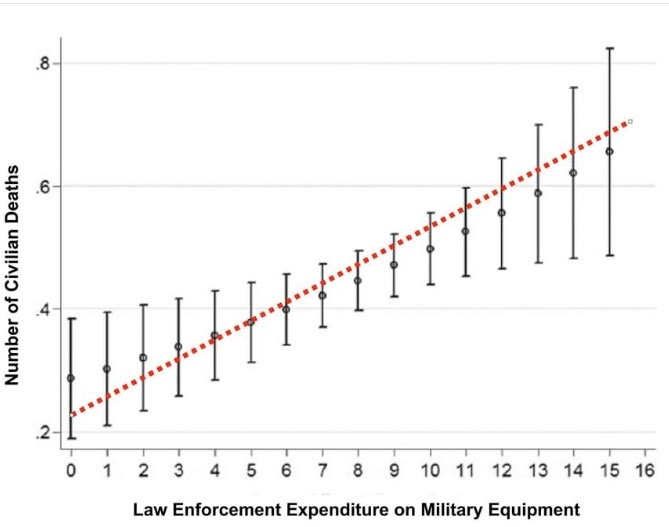Reviewed: (a portion of) the Justice in Policing Act
Speaking Security Newsletter | Congressional Candidate Advisory Note 18 | 18 June 2020
Only one newsletter this week because I was busy and had some problems but here’s something I intended to feature anyway: the latest Democratic police reform bill (as it relates to the flow of military-grade equipment to police forces).
Summary: the bill wouldn’t end the program or transfer oversight authority from DOD to DOJ (/anyone not DOD).
Situation
NBC referred to it as a “sweeping police reform bill” and the ACLU described it as “nonstarter” (due to the hundreds of millions in additional funding it would provide to law enforcement).
Lots of Democrats are behind it. Here are the co-sponsors of the Justice in Policing Act of 2020 (H.R. 7120):

How well does H.R. 7120 address police militarization?
Not well, but I only read the part that deals with the 1033/LESO program. Still worth talking about, though:

^From this study (previously featured in this newsletter)
Where does it go wrong?
Several problems but two things stand out: 1) its focus on restricting, but not returning military-grade equipment back to DOD; 2) it doesn’t shift oversight from DOD to an institution like the Department of Justice (DOJ).
1. Restricting, but not returning
The bill doesn’t call for state/local police forces to unconditionally return military-grade equipment to DOD, and I don’t get why not: a) this category of problematic equipment (‘controlled’) remains DOD property regardless of how long the matériel is in police custody; b) DOD has ordered the return of ‘controlled’ equipment before. (Read more on this here.)
2. Oversight
The bill adds layers of congressional oversight to the 1033/LESO program. Considering its persistent failure in using its oversight authority w/r/t global arms sales, I don’t know how much more often Congress would exercise its right to curb domestic arms transfers.
But the bigger problem is that the bill doesn’t appear to screw around with who runs the show. DOD does now, and that doesn’t look like that will change even if the bill becomes law.
So the frequency with which “shall submit to Congress…” shows up in the bill text may at first seem encouraging, but the fundamental problem is the preceding part, “the Secretary [of Defense]” (“…shall submit to Congress” etc).


Basically DOD is still grading its own homework, so to speak. Two big problems with this:
a) DOD has already demonstrated that sustaining/expanding the program befits its own set of institutional (political) priorities. Both police forces and DOD have a shared interest in continuing (/expanding) the program.
b) DOD is either poor at monitoring/evaluating itself or isn’t interested in doing so. Some (broad) examples:
DOD failed its first-ever audit
It became obvious that it would fail the audit after it was reported that the governing agency running the 1033/LESO program (Defense Logistics Agency, or DLA) had failed to properly document over $800 million in construction projects
Of the roughly 10,000 US military personnel at al-Udeid Air Base in Qatar, only two are tasked with investigating civilian casualties from US operations in the region (same number of Pizza Huts on the base)
Conclusion
Some have suggested that there should at least be an administrative shift from DOD to DOJ because the latter is better prepared to question the political impact of these transfers. It’s also feasible: there’s already a Justice Department monitoring/oversight mechanism in place. DOJ has a relationship with most police forces through the Bureau of Justice Assistance and a bit through the National Institute of Justice.
But I don’t have much confidence in DOJ, especially when it comes to policing. I also think it would be simpler and more effective to just terminate the whole thing.
In solidarity,
Stephen (stephen@securityreform.org; @stephensemler)

